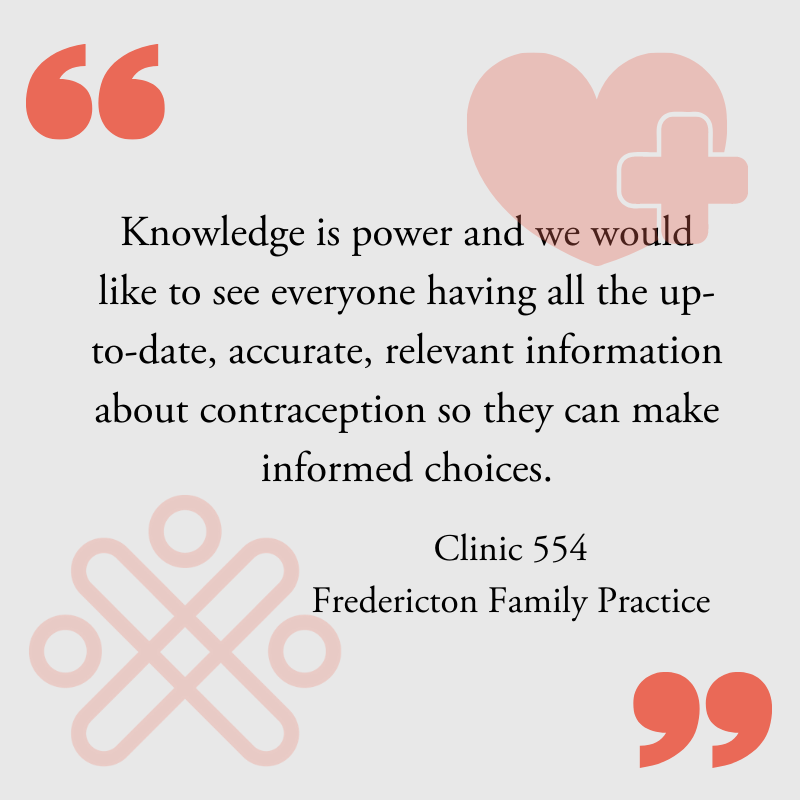
This year, we are talking about all the ways sex-ed keeps us healthy. Health care providers have a lot to say about the importance of accurate sexual health information. That’s because sex-ed gives people the right information to better take care of their bodies. This means: fewer sexually transmitted infections that can have lifelong complications, fewer unplanned pregnancies, a decline in reproductive coercion, less cervical cancers or cancers that are caught earlier, and less health issues, including infections, that get worse because we ignore their symptoms or feel embarrassed to bring them up in the doctor’s office.
We asked some amazing health care providers from across Canada to tell us what they see in their practices daily, what they hear from clients and patients, and why they think it’s important that we all have access to accurate and comprehensive sexual health education.

“We come across a lot of people who have been misinformed about sexual and reproductive health care. The most common misunderstanding we hear about may be about the IUD. Patients have gathered information online and now believe that the IUD is unsafe and causes problems that need major surgical interventions. We hear patients say "I heard nightmare stories about the IUD. People have to get them surgically removed; their uterus gets ripped out". When the risks of IUDs have been presented inaccurately, incompletely, or in a very scary way to patients, it becomes near impossible for them to hear the facts. So, despite how an IUD may be the best option for someone, they may end up choosing a contraceptive that they cannot adhere to, like a daily pill, or plan to "never have sex again". Without effective contraception, patients increase their risk of unwanted pregnancies. Knowledge is power and we would like to see everyone having all the up-to-date, accurate, relevant information about contraception so they can make informed choices.”
Clinic 554, Family practice, Fredericton, New Brunswick
“Quite often in our practice we see people who don’t know their anatomy, and this has consequences on their health and the health care they receive. We spend a lot of time answering very basic questions about bodies and reproductive health. People with vulvas and uteruses do not know their anatomy, which can make it challenging to teach about prenatal topics when, for instance, someone has no idea what a cervix is. Many people know nothing about the clitoris, or the difference between ‘vulva’ and ‘vagina’” because they haven’t received the sexual health education they deserve.”
Jenna Bly, Registered Midwife, Toronto, Ontario
“As a physician, I often see firsthand the impacts of the lack of good sexual health information. This means that people get their information off of Facebook instead of reliable sources. It takes a lot of energy to dispel these myths. In general, there is a trend to not hear the good stories and only hear the bad – just as with pregnancy, nobody goes on and on about how they completely forgot about their IUD because it is working so well!”
Shireen Mansouri CCFP(EM) FCFP, Family physician
“We have a public health crisis in Saskatchewan. We have the highest rate of new HIV infections in the country, we have outbreaks of syphilis, we face alarming rates of chlamydia and gonorrhea infections and we have one of the highest teen pregnancy rates in the country as well as one of the highest rates of intimate partner violence. In my own practice, I regularly manage teen pregnancies. I treat chlamydia and gonorrhea on an almost weekly basis. I spend more time that I would have imagined would be required dispelling myths, misinformation and misconceptions held by people of all ages about sex, contraception and disease prevention. The lack of accurate information and the missing skills have real, sometimes lifelong, impacts on my patients and I get to see that up close.
I believe that there is something we can do to help change the course and protect the people of Saskatchewan. Health care providers, politicians and the public need to recognize the scientific evidence that supports comprehensive sexuality education as a powerful upstream prevention intervention to prevent these negative health outcomes. Sometimes, we doctors don’t feel like it’s our place to become public advocates but I would passionately argue that, when the current state of our sex ed curriculum is contributing to outbreaks of disease, everyone needs to do their bit, step in and intervene."
Dr Carla Holinaty MD, CCFP, Family Physician, Saskatoon, SK
We’re facing big challenges: rising STI rates, patchwork sexuality education, high rates of gender-based violence, uneven access to abortion care, etc. Making sure people have access to high-quality sexual health information is one crucial way for people to have what they need to stay healthy and thrive.
If you want to know about why #sexedsaveslives, click here.